Difference between revisions of "Crocodile leather"
| (2 intermediate revisions by one user not shown) | |||
| Line 25: | Line 25: | ||
Crocodile skins which are processed into leather come from breeding farms. These are located in the countries where crocodiles also occur naturally, for example, Australia, Southeast Asia, Africa, and Central and South America in the Amazon Basin region. The parks earn their money as a tourist attraction, with the tasty meat of the crocodiles and the skin. The Darwin Crocodile Farm in Australia has more than 70,000 crocodiles and the leather is sent to the luxury companies, such as Louis Vuitton and Hermes. | Crocodile skins which are processed into leather come from breeding farms. These are located in the countries where crocodiles also occur naturally, for example, Australia, Southeast Asia, Africa, and Central and South America in the Amazon Basin region. The parks earn their money as a tourist attraction, with the tasty meat of the crocodiles and the skin. The Darwin Crocodile Farm in Australia has more than 70,000 crocodiles and the leather is sent to the luxury companies, such as Louis Vuitton and Hermes. | ||
| + | |||
| + | |||
| + | <p align=center> | ||
| + | [[bild:Krokodil-Fleisch-01.jpg|500px]] | ||
| + | </p> | ||
| + | <p align=center> | ||
| + | ''Crocodile meat is light, tender and tastes similar to chicken.''<br></p> | ||
| + | <p> </p> | ||
Only the belly side and skins of younger animals are usually used for crocodile leather. The back skin is too hard because of the armour, especially on the older animals. This is also a reason for the high price of such leather. That and the fact that they are kept only for their skin. In other words, the leather of these animals must bear the cost of breeding. | Only the belly side and skins of younger animals are usually used for crocodile leather. The back skin is too hard because of the armour, especially on the older animals. This is also a reason for the high price of such leather. That and the fact that they are kept only for their skin. In other words, the leather of these animals must bear the cost of breeding. | ||
| Line 74: | Line 82: | ||
<p align=center> | <p align=center> | ||
''Folder of crocodile leather back of 1958 - inside - outside - close-up.''<br></p> | ''Folder of crocodile leather back of 1958 - inside - outside - close-up.''<br></p> | ||
| + | <p> </p> | ||
| + | |||
| + | A few decades ago, crocodile leather handbags were a status symbol and an asset with increasing value. Those days are over. Nowadays, a crocodile handbag for young ladies is no longer a desirable goal. In times of [[Leather sustainability and traceability|animal welfare and sustainability]], a crocodile handbag no longer fits in. The falling values are also reflected in the resale value. Crocodile leather handbags are only expensive if they are coveted brands or bags from celebrities. | ||
| + | |||
| + | |||
| + | <p align=center> | ||
| + | [[bild:Crocodile-leather-handbag.jpg|500px]] | ||
| + | </p> | ||
| + | <p align=center> | ||
| + | ''Gone are the days when a crocodile leather handbag was a status symbol.''<br></p> | ||
<p> </p> | <p> </p> | ||
| Line 197: | Line 215: | ||
</p> | </p> | ||
<p align=center> | <p align=center> | ||
| − | [[bild:Handtasche- | + | ''[[Leather handbags|Handbag]] with crocodile head on the front. ''<br></p> |
| + | <p> </p> | ||
| + | |||
| + | <p align=center> | ||
| + | [[bild:Alligator-Handtasche-50iger-Jahre.jpg|500px]] | ||
</p> | </p> | ||
<p align=center> | <p align=center> | ||
| − | ''[[Leather handbags| | + | ''[[Alligator leather|Alligator head]] on a [[Leather handbags|handbag]] from the 50s.''<br></p> |
<p> </p> | <p> </p> | ||
| Line 207: | Line 229: | ||
</p> | </p> | ||
<p align=center> | <p align=center> | ||
| − | [[bild: | + | [[bild:Krokodil-Lederhandtasche-Krokobeine-Taschengriff.jpg|500px]] |
</p> | </p> | ||
<p align=center> | <p align=center> | ||
| − | ''Crocodile | + | ''Crocodile legs as a handle for the handbag.''<br></p> |
<p> </p> | <p> </p> | ||
| Line 217: | Line 239: | ||
</p> | </p> | ||
<p align=center> | <p align=center> | ||
| − | + | ''[[Leather belt|Fanny pack]] made of a crocodile paw (Goldpfeil 1954).''<br></p> | |
| − | + | ||
| − | + | ||
| − | ''[[Leather belt|Fanny pack]] made of a crocodile paw (Goldpfeil 1954) | + | |
<p> </p> | <p> </p> | ||
| − | |||
| − | |||
| − | |||
| − | |||
<p align=center> | <p align=center> | ||
[[bild:Krokotasche-falscher-Kopf-02.jpg|500px]] | [[bild:Krokotasche-falscher-Kopf-02.jpg|500px]] | ||
| Line 239: | Line 254: | ||
</p> | </p> | ||
<p align=center> | <p align=center> | ||
| − | + | ''Crocodile leather as a [[Leather floors -Leather tiles - Leather panels|carpet]].''<br></p> | |
| − | + | ||
| − | + | ||
| − | ''Crocodile leather as a [[Leather floors -Leather tiles - Leather panels|carpet]] | + | |
<p> </p> | <p> </p> | ||
| + | |||
| + | ==Embossed cow leather== | ||
| + | [[cow leather|Cowhide leather]] can also be provided with a [[Embossed leather|crocodile embossing]]. Even for experts, the distinction is not always easy. | ||
| + | |||
<p align=center> | <p align=center> | ||
| − | [[bild: | + | [[bild:Krokoleder-02.jpg|500px]] |
</p> | </p> | ||
<p align=center> | <p align=center> | ||
| − | '' | + | ''Real crocodile [[leather grain]].''<br></p> |
<p> </p> | <p> </p> | ||
| − | |||
| − | |||
<p align=center> | <p align=center> | ||
Latest revision as of 16:26, 11 April 2023
Contents
Crocodile leather
Crocodiles are reptiles with a firm skin which acts as a form of armour. There are about 25 species found in Central America, Africa and from India to Australia. Crocodiles live in fresh and salt water (Australia and Southeast Asia).
Alligators are subspecies of crocodiles. Among the subspecies of alligators are the caimans. Alligators exist in America and China. There are caimans in South America] up to Central America.
Crocodile leather (also called "croco leather"), as well as caiman leather and alligator leather is used for bags, shoes or belts.
Caiman from the Pantanal in Brazil.
Crocodile skins which are processed into leather come from breeding farms. These are located in the countries where crocodiles also occur naturally, for example, Australia, Southeast Asia, Africa, and Central and South America in the Amazon Basin region. The parks earn their money as a tourist attraction, with the tasty meat of the crocodiles and the skin. The Darwin Crocodile Farm in Australia has more than 70,000 crocodiles and the leather is sent to the luxury companies, such as Louis Vuitton and Hermes.
Crocodile meat is light, tender and tastes similar to chicken.
Only the belly side and skins of younger animals are usually used for crocodile leather. The back skin is too hard because of the armour, especially on the older animals. This is also a reason for the high price of such leather. That and the fact that they are kept only for their skin. In other words, the leather of these animals must bear the cost of breeding.
Belly side of a caiman.
Back side, seen in the DLM - German Leather Museum in Offenbach.
Nowadays only leather of breeding animals is processed according to strict regulations (CITES - Convention on International Trade in Endangered Species of wild fauna and flora). Nevertheless, this use is considered as inhumane by organisations such as PETA.
Crocodile leather is calculated according to length (inches). 1 inch = 2.54 cm. Usually hides are offered between 28 and 35 cm width.
Crocodile leather back.
A duller version of crocodile leather.
Folder of crocodile leather back of 1958 - inside - outside - close-up.
A few decades ago, crocodile leather handbags were a status symbol and an asset with increasing value. Those days are over. Nowadays, a crocodile handbag for young ladies is no longer a desirable goal. In times of animal welfare and sustainability, a crocodile handbag no longer fits in. The falling values are also reflected in the resale value. Crocodile leather handbags are only expensive if they are coveted brands or bags from celebrities.
Gone are the days when a crocodile leather handbag was a status symbol.
Leather handbag made of crocodile back. The armour is very distinctive.
Leather bag made of crocodile back, probably from 1890.
Old leather luggage with crocodile back.
Leather luggage and leather handbag made of crocodile leather from Sams & Son in Germany.
Leather handbag with polished armour (also known from stingray leather).
The gloss of glazed crocodile leather is achieved by surface compressing and pressing.
Leather furniture made of crocodile leather. Sale price of the sofa 30 thousand € April 2011 and 40 thousand euro April 2013.
leather shoes and boots made of crocodile leather. - Shoe from caiman leather of Himer bespoke shoes in Germany.
Leather belt and Leather wallet made in France by Pierre Guijarro, 78500 Sartrouville, p.guijarro@orange.fr.
Motorcycle saddle made of crocodile leather.
Stuffed young crocodile.
An unusual crocodile leather handbag. - The whole animal was processed.
Handbag with crocodile head on the front.
Alligator head on a handbag from the 50s.
Crocodile legs as a handle for the handbag.
Fanny pack made of a crocodile paw (Goldpfeil 1954).
In this crocodile bag, the head does not appear to be from the actual head of the crocodile. It is probably genuine crocodile, but from a different part of the animal.
Crocodile leather as a carpet.
Embossed cow leather
Cowhide leather can also be provided with a crocodile embossing. Even for experts, the distinction is not always easy.
Real crocodile leather grain.
Cow leather with croco embossing. - Embossing of the back.
Cowhide croco embossed in a classic car.
Seams with croco optics
Generating a crocodile-back look by sewing.
Imitation leather
Croco embossed imitation leather.
Similar leather of other animal species
Leather from ostrich legs, chicken legs and beaver tail look like croco-leather. In times when beavers were still allowed to be hunted, beaver tail was an inexpensive substitute for crocodile leather.
ostrich legs, chicken legs and beaver tails can be confused with crocodile leather.
Video about leather of different animal species
Leather of different animal species - Exotic leather
Additional information
- Exotic leather
- CITES - Convention on International Trade in Endangered Species of wild fauna and flora
- PeTA - Critical consideration of leather production
Other exotic leather
- Alligator leather
- Alpaca fur
- Antelope leather
- Armadillo leather
- Bird leather
- Bull testicles
- Caiman leather
- Camel leather
- Carpincho leather
- Cat fur
- Chicken leather
- Dog leather
- Donkey leather
- Elephant leather
- Fish leather: Eel, shark, salmon, moray eel, stingray and many others
- Frog leather - Toad leather
- Giraffe leather
- Hippo Leather
- Horsehide - Horse leather
- Kangaroo leather
- Llama Fur
- Lizard leather
- Ostrich leather
- Pangolin leather
- Peccary leather
- Rumen leather
- Sealskin leather
- Snakeskin
- Turtle skin
- Walrus leather
- Yak leather
- Zebra hide


























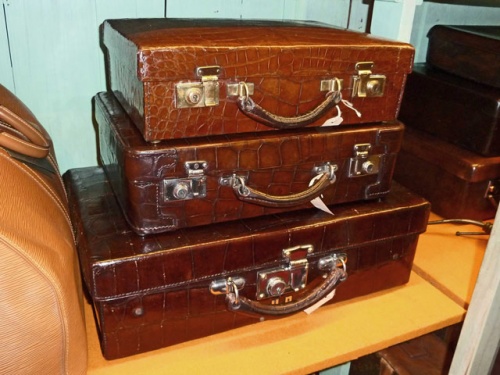


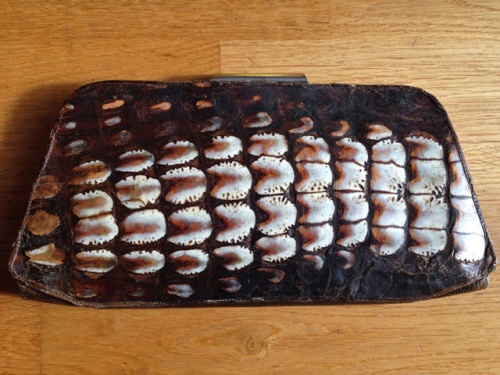


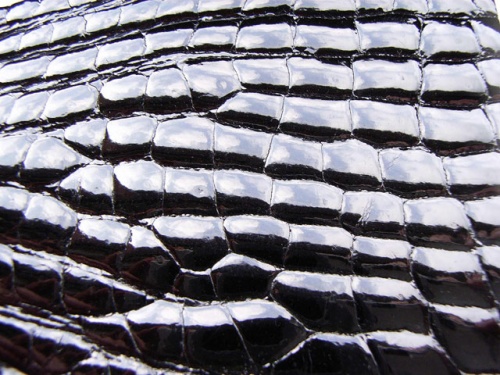
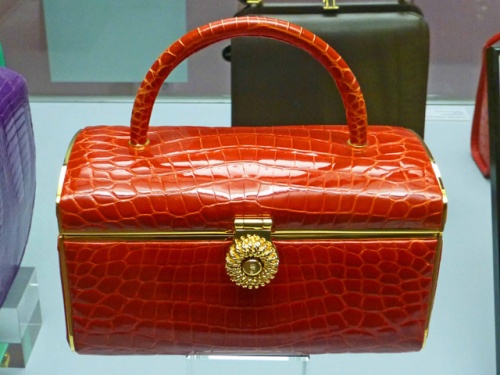








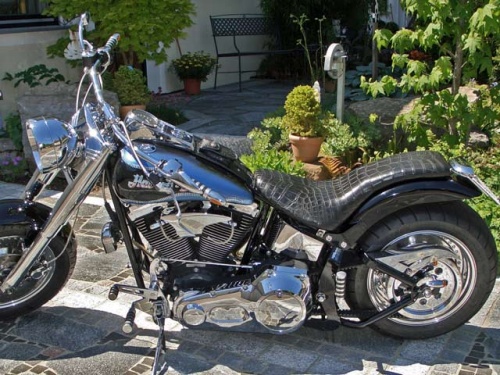

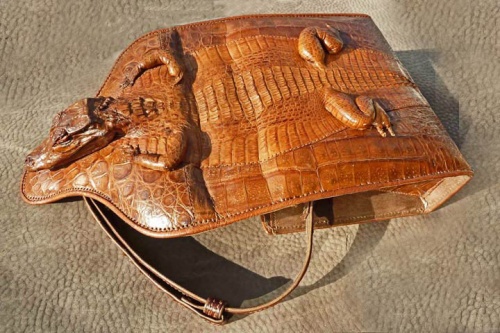
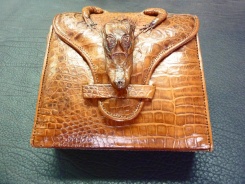
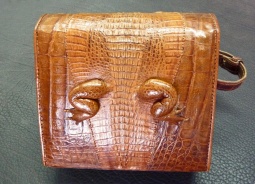
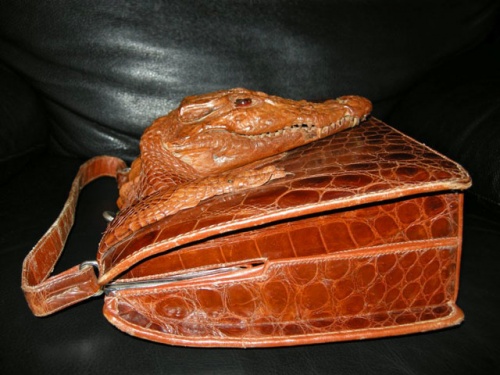
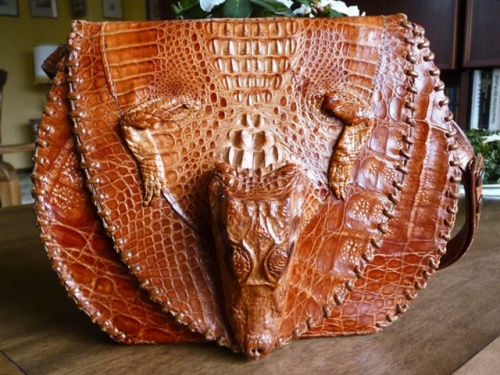


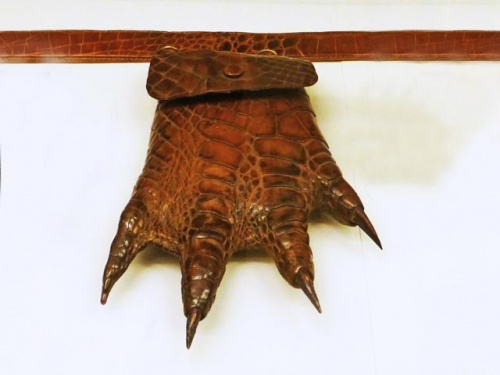


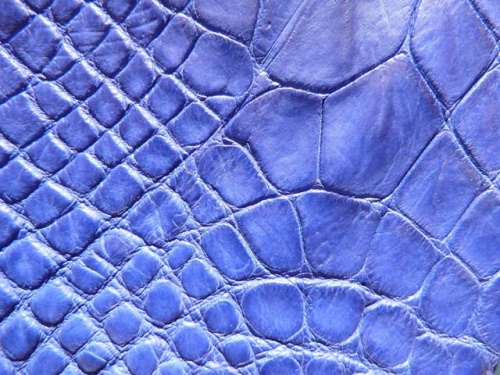











 a kotori web solution
a kotori web solution